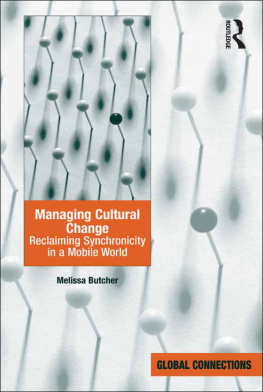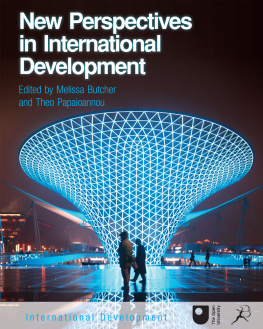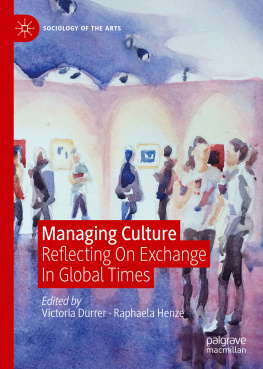MANAGING CULTURAL CHANGE
Global Connections
Series Editor: Robert Holton, Trinity College, Dublin
Global Connections builds on the multi-dimensional and continuously expanding interest in Globalization. The main objective of the series is to focus on connectedness and provide readable case studies across a broad range of areas such as social and cultural life, economic, political and technological activities.
The series aims to move beyond abstract generalities and stereotypes: Global is considered in the broadest sense of the word, embracing connections between different nations, regions and localities, including activities that are trans-national, and trans-local in scope; Connections refers to movements of people, ideas, resources, and all forms of communication as well as the opportunities and constraints faced in making, engaging with, and sometimes resisting globalization.
The series is interdisciplinary in focus and publishes monographs and collections of essays by new and established scholars. It fills a niche in the market for books that make the study of globalization more concrete and accessible.
Also published in this series:
Cosmopolitanism in Practice
Edited by Magdalena Nowicka and Maria Rovisco
ISBN 978-0-7546-7049-0
Globalization and Third World Women
Exploitation, Coping and Resistance
Edited by Ligaya Lindio-McGovern and Isidor Wallimann
ISBN 978-0-7546-7463-4
Global Perspectives on War, Gender and Health
The Sociology and Anthropology of Suffering
Edited by Hannah Bradby and Gillian Lewando Hundt
ISBN 978-0-7546-7523-5
Decolonizing European Sociology
Transdisciplinary Approaches
Edited by Encarnacin Gutirrez Rodrguez, Manuela Boatca and Srgio Costa
ISBN 978-0-7546-7872-4
Managing Cultural Change
Reclaiming Synchronicity in a Mobile World
MELISSA BUTCHER
Open University, UK
First published 2011 by Ashgate Publishing
Published 2016 by Routledge
2 Park Square, Milton Park, Abingdon, Oxon OX14 4RN
711 Third Avenue, New York, NY 10017, USA
Routledge is an imprint of the Taylor & Francis Group, an informa business
Copyright Melissa Butcher 2011
Melissa Butcher has asserted her right under the Copyright, Designs and Patents Act, 1988, to be identified as the author of this work.
All rights reserved. No part of this book may be reprinted or reproduced or utilised in any form or by any electronic, mechanical, or other means, now known or hereafter invented, including photocopying and recording, or in any information storage or retrieval system, without permission in writing from the publishers.
Notice:
Product or corporate names may be trademarks or registered trademarks, and are used only for identification and explanation without intent to infringe.
British Library Cataloguing in Publication Data
Butcher, Melissa, 1966-
Managing cultural change : reclaiming synchronicity in a mobile world. -- (Global connections)
1. Social integration. 2. Belonging (Social psychology) 3. Adjustment (Psychology) 4. International business enterprises--Employees--Psychology. 5. Cross-cultural orientation. 6. Cosmopolitanism.
I. Title II. Series
302'.08-dc22
Library of Congress Cataloging-in-Publication Data
Butcher, Melissa, 1966-
Managing cultural change : reclaiming synchronicity in a mobile world / by Melissa Butcher.
p. cm. -- (Global connections)
Includes bibliographical references and index.
ISBN 978-1-4094-2510-6 (hbk) -- ISBN 978-1-3155-9350-0 (ebook)
1. Multiculturalism. 2. Cultural pluralism. 3. Diversity in the workplace. 4. Cultural fusion. 5. Cosmopolitanism. 6. Assimilation
(Sociology) I. Title.
HM1271.B88 2011
303.48'209--dc23
2011030392
ISBN 9781409425106 (hbk)
ISBN 9781315593500 (ebk)
ISBN 9781317101826 (ebk-ePUB)
Contents
Acknowledgements
First and foremost to all the research participants who have generously given their time over the years, my thanks for their patience with my many questions. Thanks also to the many colleagues who have challenged my ideas and provided feedback on earlier drafts of these chapters, in particular: Tamerlaine Beasley, Anita Harris, Bob Holton, and the Oecumene reading group. Thanks to Ariel Terranova-Webb for excellent work in untangling my many impenetrable sentences. Any mistakes in this final text are entirely my own. Sage, India, Taylor & Francis and Wiley Publishing have kindly given permission for the reuse of material from earlier published work which is much appreciated. Finally, many thanks to Michael for his never failing provision of tea and sympathy.
Chapter 1
Synchronous Moments
All things fall and are built again
(Lapis Lazuli, W.B. Yeats)
It is impossible not to reflect on global distinctions when arriving at Heathrow Airport, London, with an EU passport that only needs to be held up for a cursory glance by an immigration officer. To the left Africa and Asia queue up and wait. I could probably be labelled a member of the transnational capitalist class (Sklair 2001), although I take shelter in writing academic in the Usual Occupation section of Arrivals forms when theyre necessary. I am a member of what Saskia Sassen describes as a professional class of migrant, incorporated into a legal, formal administration, probably disappearing from the category of migrant altogether depending on which of my passports I use. There are an estimated 175200 million migrants globally (Crowley and Hickman 2008; GCIM 2005), that is, 23 per cent of the worlds population who do not live in the country where they were born. However, this statistic takes no account of the tens of thousands of people travelling each day for business or tourism or short trips back home. It doesnt take into account internal mobility, or rural to urban migration. It doesnt take into account psychological mobility: the capacity to imagine the self in new social roles, as a result of the mobility of others, images and ideas. The number doesnt take into account the motivations for uprooting the self: from escaping grinding poverty, to the desire to explore for curiositys sake, because we imagine another world, another life, the desire for challenge and the desire to engage with difference.
Across disciplines, the cultural impact of this immense mobility has been widely discussed.to move has gained in value, it has also become a marker of the divisions in the impact of contemporary globalisation: between those with the ability and the means to move, and those without; between those who can choose when to leave and when to return, and those who cannot (see Turner 2010; Adey 2006). Some clearly have more freedom to move than others and all is not so liquid (Bauman 2000) in our world today.
This dichotomy of movement and immobility, and the blurring of boundaries between near and far, generates a tension predicated on the need to manage change: internal processes that result from shifts in the sense of self and well-being; and external processes that result from transformations in the wider cultural context. The State and individuals adopt strategies to manage the presence of the stranger and strange things, and the change that strangers represent (Ahmed 2000). In addition, in a mobile world the individual now also needs to manage at times feeling like a stranger in their own home. These processes of change management, as the following chapters will elaborate, require an awareness of cultural, as much as territorial, boundaries; of lines on maps and in minds which mark out complex environments where cultural borders meet.













